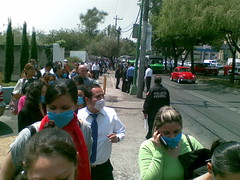 As swine flu cases continue to appear in more countries around the world and governments issue international travel warnings, the contemporary reality of a flu pandemic may be less frightening than its popular and historical associations might suggest, says Dan Gardner, a fear expert in a BBC radio interview. Since people are most familiar with great numbers of deaths in the 1918 influenza outbreak, for instance, but not the real meaning of “pandemic,” (the contemporaneous infection of many people in many parts of the world) the word raises “the emotional temperature” of the public, Gardner believes. Swine flu cases have been confirmed across the world, with new cases reported in New Zealand and Israel, but according to Gardner, it’s unlikely that this will follow the catastrophic 1918 influenza outbreak. Still, travel to areas with confirmed cases, specifically Mexico where about 150 people have died, is ill advised.
As swine flu cases continue to appear in more countries around the world and governments issue international travel warnings, the contemporary reality of a flu pandemic may be less frightening than its popular and historical associations might suggest, says Dan Gardner, a fear expert in a BBC radio interview. Since people are most familiar with great numbers of deaths in the 1918 influenza outbreak, for instance, but not the real meaning of “pandemic,” (the contemporaneous infection of many people in many parts of the world) the word raises “the emotional temperature” of the public, Gardner believes. Swine flu cases have been confirmed across the world, with new cases reported in New Zealand and Israel, but according to Gardner, it’s unlikely that this will follow the catastrophic 1918 influenza outbreak. Still, travel to areas with confirmed cases, specifically Mexico where about 150 people have died, is ill advised.
The Pakistani army increased air attacks on suspected Taliban military bases in the Buner district, which was overrun by insurgents last week. The air raids are seen as a prelude to movement into the region of a substantial force of ground troops. Thousands of residents fled the district to escape the rising level of conflict and the imposition of sharia law by the Taliban, which President Asif Ali Zardari allowed in select areas of the country earlier this month. Critics of Zardari’s deal with Taliban leaders say that the agreement emboldened the extremists. One retired military officer, Brig. Gen. Shaukat Qadir, writes in The National that Zardari “will go down in history as the one who succumbed to those terrorist threats” and handed part of the country to the militants.
 Attacks in southern Thailand killed at least nine people Tuesday as militant separatists marked the fifth anniversary of a mosque raid that prompted an intensified conflict between the Buddhist government and the Muslim minority. The five coordinated attacks, including a drive-by shooting and a raid on a house, are not unusual, according to the BBC, in a region where more than 3,400 people have been killed by conflict in the last five years. One attack in 2004 killed 100 people and spurred the insurgency that wants autonomy or independence for the region that borders Malaysia—where natives speak a Malay dialect and are predominately Muslim. It had been annexed by the Thai government in 1902.
Attacks in southern Thailand killed at least nine people Tuesday as militant separatists marked the fifth anniversary of a mosque raid that prompted an intensified conflict between the Buddhist government and the Muslim minority. The five coordinated attacks, including a drive-by shooting and a raid on a house, are not unusual, according to the BBC, in a region where more than 3,400 people have been killed by conflict in the last five years. One attack in 2004 killed 100 people and spurred the insurgency that wants autonomy or independence for the region that borders Malaysia—where natives speak a Malay dialect and are predominately Muslim. It had been annexed by the Thai government in 1902.
Jacob Zuma, the embattled leader of South Africa’s ANC party, emerged the winner in last week’s election, but observers wonder whether he will be able to live up to supporters’ expectations of empowering the country. Zuma is faced with many serious national concerns, including alleviating poverty at a time when job losses are expected to soar amid dwindling public confidence. The ANC, the ruling party for the last 15 years, received 65.9 percent of the votes but fell just shy of the critical two-thirds majority in parliament. Corruption and sex scandals allegedly involving Zuma rocked the country in the run up to the election.